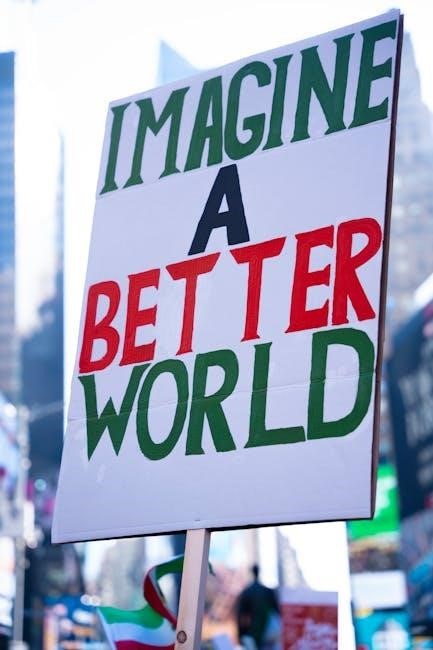world politics: trend and transformation pdf
World politics involves studying global interactions, power dynamics, and transformations․ This section introduces key concepts, trends, and factors shaping international relations, providing foundational insights into global political systems and their evolution․
1․1․ Understanding the Concept of World Politics
World politics, or international relations, involves interactions between nations, organizations, and individuals on a global scale․ It examines power dynamics, diplomacy, economic relations, and cultural exchanges․ The concept encompasses how states interact to achieve interests, resolve conflicts, and address global challenges․ Understanding world politics requires analyzing historical trends, current events, and future transformations shaping the global landscape, as highlighted in texts like World Politics: Trend and Transformation․ This field is crucial for grasping the complexities of modern global interactions․
1․2․ The Importance of Analyzing Trends and Transformations
Analyzing trends and transformations in world politics is essential for understanding the complexities of global interactions․ By examining shifts in power, economic systems, and cultural influences, scholars and policymakers can identify patterns shaping international relations․ This analysis aids in predicting future scenarios, mitigating conflicts, and fostering cooperation․ The book World Politics: Trend and Transformation emphasizes the importance of this approach, providing insights into globalization, nationalism, and technological advancements, which are critical for navigating an increasingly interconnected world․
1․3․ Overview of the Book “World Politics: Trend and Transformation”
The book World Politics: Trend and Transformation provides a comprehensive analysis of global political dynamics, exploring key trends and transformations shaping international relations․ Authored by experts like Blanton and Kegley, it covers topics such as globalization, nationalism, and technological advancements․ The text combines cutting-edge research with real-world examples, offering insights into shifts in power distribution, emerging global players, and regional conflicts․ Designed for students and scholars, it serves as a valuable resource for understanding the complexities of modern world politics․
Key Factors Driving Trends in World Politics
Globalization, power shifts, and nationalism are key drivers of trends in world politics, influencing international relations and global governance․
Economic transformations, technological advancements, and rising nationalism further shape these dynamics, creating a complex landscape of opportunities and challenges․
2․1․ Globalization and Its Impact on International Relations
Globalization has profoundly shaped international relations by fostering economic interdependence, cultural exchange, and political cooperation․ It has created a more interconnected world, enabling transnational actors to influence global governance․ However, globalization also intensifies inequalities and sparks nationalist backlashes, challenging traditional state-centric systems․ Its dual impact highlights the need for adaptive strategies to address both opportunities and conflicts arising from increased global integration․

2․2․ The Role of Power and Influence in Shaping Global Dynamics
Power and influence are central to global dynamics, determining the distribution of resources and the direction of international relations․ Traditional state power, economic influence, and soft power strategies shape geopolitical landscapes․ Emerging powers challenge existing hierarchies, while non-state actors increasingly exert influence․ This evolving balance of power demands adaptive strategies to navigate shifting alliances and rivalries, ensuring stability in a multipolar world․
2․3․ The Rise of Nationalism and Populism
Nationalism and populism have emerged as significant forces in modern world politics, reshaping global dynamics․ These movements often emphasize national sovereignty, cultural identity, and anti-establishment sentiments․ The rise of populist leaders and nationalist policies has led to increased tensions between states, challenging multinational cooperation․ Events like Brexit and the resurgence of protectionist policies highlight this trend, reflecting a shift away from globalization and toward inward-focused governance, impacting international relations and global stability․

Geopolitical Transformations in the 21st Century
Shifts in global power distribution, emerging new players, and regional conflicts redefine international relations, reflecting a dynamic and evolving geopolitical landscape in the modern era․
3․1․ Shifts in Global Power Distribution
The 21st century has witnessed significant shifts in global power distribution, with emerging economies like China and India rising to prominence․ Traditional Western dominance is declining, leading to a multipolar world․ This transformation is driven by economic growth, military expansion, and technological advancements in non-Western nations․ Regional conflicts and alliances are reshaping influence, creating new power centers․ These shifts impact international relations, global governance, and the balance of power, reflecting a dynamic and evolving geopolitical landscape․
3․2․ The Emergence of New Global Players
The 21st century has seen the rise of new global players, reshaping international relations․ Nations like China, India, and Brazil have emerged as significant economic and political forces․ Their growing influence challenges traditional Western dominance, creating a multipolar world․ These players leverage technological advancements, economic growth, and strategic alliances to assert their roles․ Their emergence fosters new power dynamics, influencing global governance, trade, and security frameworks, and underscores the evolving nature of world politics in the modern era․
3․3․ Regional Conflicts and Their Global Implications
Regional conflicts, such as territorial disputes and political instability, significantly impact global stability․ These conflicts often stem from historical grievances, resource competition, and ideological differences․ Their implications extend beyond borders, affecting trade, security, and humanitarian crises․ Global powers frequently intervene, either directly or through international organizations, to mediate or contain these disputes․ The rise of nationalism and shifting alliances further complicates resolution efforts, making regional conflicts a critical area of study in understanding global political dynamics and their far-reaching consequences․
Economic Trends and Their Impact on World Politics
Globalization, trade, and financial shifts significantly influence political dynamics, shaping economic interdependence and power structures among nations, while sanctions and emerging markets further transform global relations․
4;1․ The Role of International Trade and Finance
International trade and finance are central to global economic interdependence, driving political alliances and conflicts․ Economic policies, trade agreements, and financial institutions shape power dynamics, fostering cooperation or tension․ The rise of emerging markets and the impact of sanctions highlight the transformative role of economic factors in world politics, influencing stability and global governance structures․
4․2․ The Influence of Economic Sanctions and Trade Wars
Economic sanctions and trade wars significantly impact global politics, often destabilizing economies and provoking political tensions․ Sanctions can isolate nations, while trade wars redistribute economic power, influencing international relations․ These tools are used strategically to exert pressure, reshape alliances, and protect economic interests, but they also risk triggering retaliatory measures and broader geopolitical instability, as seen in recent conflicts between major economies․
4․3․ The Growing Importance of Emerging Markets
Emerging markets are increasingly shaping global economic and political landscapes․ Countries like China, India, and Brazil are driving growth, innovation, and trade, challenging traditional power structures․ Their rise fosters economic interdependence and shifts geopolitical influence, creating new opportunities and challenges for international relations․ These markets attract foreign investment and stimulate competition, contributing to a more multipolar world economy․
Technological Advancements and Their Role in World Politics
Technological advancements significantly influence global interactions, governance, and security, while social media reshapes political narratives and public engagement worldwide․
5․1․ The Impact of Digital Technologies on Global Governance
Digital technologies have revolutionized global governance by enhancing transparency, enabling real-time communication, and facilitating data-driven decision-making․ These tools empower international organizations to address complex challenges more effectively, fostering collaboration and accountability․ However, they also introduce risks such as cybersecurity threats and data privacy concerns, necessitating robust regulatory frameworks to ensure ethical and secure use of technology in governing global affairs․ This transformation is reshaping the way nations interact and cooperate on a multinational scale․
5․2․ Cybersecurity Threats and Their Implications
Cybersecurity threats have emerged as a critical challenge in world politics, undermining global stability and trust․ State and non-state actors increasingly exploit digital vulnerabilities, targeting critical infrastructure, governments, and corporations․ These threats disrupt international relations, escalate tensions, and pose risks to economic and political systems․ Addressing these challenges requires robust international cooperation, shared protocols, and advanced technological defenses to safeguard sensitive information and maintain global security in an increasingly interconnected world․
5․3․ The Role of Social Media in Shaping Political Narratives
Social media has become a powerful tool in shaping political narratives worldwide․ Platforms like Twitter and Facebook facilitate rapid information dissemination, influencing public opinion and political agendas․ They enable leaders to bypass traditional media, fostering direct engagement with citizens․ However, this also amplifies misinformation and polarization, challenging democratic processes․ The transformative impact of social media on global politics underscores the need for ethical governance and media literacy to navigate its dual role in empowering and destabilizing societies․

Environmental and Climate Change Issues
Climate change and environmental degradation significantly impact global stability and cooperation, necessitating sustainable solutions to address these pressing challenges effectively․
6․1․ The Global Response to Climate Change
Addressing climate change requires collective action, with international agreements like the Paris Accord aiming to reduce emissions and promote sustainability․ Global cooperation is crucial to mitigate environmental degradation and its impacts on political stability․ International organizations play a key role in shaping policies and fostering collaboration․ However, challenges such as resource competition and governance gaps persist, highlighting the need for innovative solutions and equitable strategies to ensure a sustainable future for all nations․
6․2․ The Impact of Environmental Degradation on International Relations
Environmental degradation strains international relations, as resource scarcity and ecological crises fuel tensions between nations․ Issues like deforestation and water shortages often lead to conflicts over shared resources․ Additionally, climate-induced migration places pressure on bordering countries, exacerbating political tensions; Global cooperation is essential to address these challenges, yet differing priorities and responsibilities often hinder agreement․ The interplay between environmental degradation and geopolitics underscores the need for sustainable solutions to maintain peace and stability in an increasingly interconnected world․
6․3․ Sustainability and Its Role in Global Politics
Sustainability has become a central theme in global politics, addressing climate change, resource management, and social equity․ It shapes policies, international agreements, and economic strategies, emphasizing long-term environmental stewardship․ Nations increasingly recognize sustainability as vital for security and development, integrating it into global governance frameworks․ The Paris Agreement exemplifies this trend, uniting countries to combat climate change․ Sustainability also influences trade, diplomacy, and conflict resolution, fostering cooperation and innovation to ensure a resilient future for all nations and generations․

The Future of World Politics: Predictions and Scenarios
Exploring potential global scenarios, this section examines future trends, challenges, and opportunities shaping international relations, offering insights into how world politics may evolve in the coming decade․
7․1․ Potential Global Scenarios in the Next Decade
The next decade may see a rise in multipolar power structures, with emerging markets gaining influence․ Challenges like climate change, technological disruptions, and geopolitical tensions could reshape global dynamics․ Scenarios include increased regional conflicts, shifts in economic dominance, and the growing role of non-state actors․ International cooperation will be crucial to address these challenges and foster stability in an increasingly interconnected world․
7․2․ The Role of International Organizations in Shaping the Future
International organizations play a pivotal role in addressing global challenges and fostering cooperation․ They facilitate dialogue, set standards, and implement policies to tackle issues like climate change, economic inequality, and conflict resolution․ By promoting multilateralism, these institutions help nations navigate complex interdependencies, ensuring a more stable and equitable world․ Their adaptability to emerging trends will be crucial in shaping a future marked by sustainability, security, and shared prosperity․
7․3․ Strategies for Addressing Global Challenges
Addressing global challenges requires comprehensive strategies that prioritize multilateral cooperation, technological innovation, and sustainable development․ Strengthening international agreements, investing in renewable energy, and promoting equity can mitigate climate change and economic disparities․ Leveraging digital tools enhances governance and transparency, while fostering diplomacy helps resolve conflicts․ Empowering local communities ensures inclusive solutions․ These approaches, aligned with global trends, are essential for building a resilient and equitable future, ensuring long-term stability and prosperity for all nations and generations․
World politics is dynamic, shaped by shifting trends and transformations․ Understanding these changes is crucial for navigating the complexities of the 21st century global landscape effectively․
8․1․ Summarizing Key Trends and Transformations
Globalization, shifting power dynamics, and the rise of nationalism are central trends in world politics․ Economic interdependence, technological advancements, and environmental challenges shape transformations․ The balance between cooperation and conflict remains critical, as new global players emerge and traditional powers adapt․ These shifts underscore the complexity of modern international relations, emphasizing the need for adaptability and multilateral approaches to address shared challenges and foster stability in an evolving world order․
8․2․ The Need for Adaptation and Cooperation in a Changing World
In a rapidly evolving global landscape, adaptation and cooperation are essential for addressing shared challenges․ The rise of new powers, technological advancements, and environmental crises demand innovative approaches to diplomacy and governance․ International organizations play a pivotal role in fostering collaboration, while nations must embrace flexibility to navigate shifting dynamics․ By prioritizing collective strategies, the global community can mitigate risks and seize opportunities, ensuring a more resilient and equitable future for all in an interconnected world․
